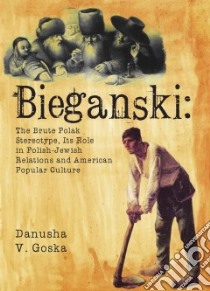Bieganski - 9781936235155
Un libro in lingua di Goska Danusha V. edito da Academic Studies Pr, 2010
- € 62.90
- Il prezzo è variabile in funzione del cambio della valuta d’origine
"Danusha Goska's daring and far-reaching study examines the sources and prevalence of stereotyped images of Poles as brutal, subhuman creatures, Drawing on her extensive research in history, popular culture, and folklore, and also on interviews of Poles and Jews in America today, she teaches us all something profound about how the image of the Polak originated and why it continues to flourish."-John Guzlowski, author of The Third Winter of War: Buchenwald and Lightning and Ashes
"A powerful, provocative, ultimately profound work of scholarship regarding the stereotypification of Poles and its implications not only for Polish-Jewish relations in the Old World and the New, but also for anyone wishing to fathom the inter-workings of class and ethnicity in an America that has all too often fallen short of its promise."-James P. Leary, folklorist, University of Wisconsin
"In this most important work, Dr. Goska's style incorporates those necessary ingredients that justify writing as an art form. Her imagery is robust, but yet it never gets in the way of the underlying premises of her arguments. Moreover, her thinking is crisp, and her knowledge of this very sensitive topic is thoroughly evident. Indeed, the reader cannot help but be persuaded by the logical unfolding of the positions she brings to this necessary work."
Dr. Michael Herzbrun, Rabbi Temple Emanu-El, Rochester, NY
"Stereotypes of Poles have been commonplace in Western society, Danusha V. Goska presents a comprehensive overview of such images in a balanced fashion. She offers no apologetic for genuine instances of Polish anti-Semitism, but she also exposes those rooted in outright prejudice with no foundation in fact. An important contribution to improved Polish-Jewish understanding."-John T. Pawlikowski, OSM, PhD, professor of Social Ethics, Director, Catholic-Jewish Studies Program Catholic Theological Union Chicago
"Bieganski is a truly important book because it challenges and demolishes the widely held belief that Poles are nothing more than ignorant and brutish anti-Semites who played a central role in causing the Holocaust. Goska does a first-rate job of describing how Jews and Poles really inter - acted with each other over their rich history together. Let's hope that this book is widely read and helps change the conventional wisdom about Polish-Jewish relations."-John J. Mearsheimer, R. Wendell Harrison Distinguished Service Professor of Political Science, University of Chicago
This work addresses Bieganski, one stereotype of Poles. Other Eastern European, Christian, peasant-based populations are conflated under this stereotype, while Poles, given the size of their population and the location of Nazi death camps in Poland, remain the primary target. In the stereotype in question, Poles are brutes. They possess the qualities of animals. They are physically strong, stupid, violent, fecund, anarchic, dirty, and especially hateful in a way that more evolved human beings are not. They are thuggishly, primitively nationalistic. The special hatefulness of Bieganski is epitomized by his Polish anti-Semitism. This stereotype relies on images of Eastern Europeans that have existed for centuries, and has been produced, significantly, by Poles themselves, Jews, Germans, and Americans.
Regardless of the actual status of the stereotyper, the stereotype reflects the perspective of someone relatively empowered, literate, urban, mobile, and mercantile observing relatively disempowered, oral, rural, poor, Eastern European Christian peasants. This stereotype relies for its power on a modern person's disgust and contempt for actual or imaginary qualities associated with peasantry: dirt, primitive dwellings, contact with animal dung and its odors, rootedness, powerlessness, sexual savagery, coarse social manners, and a lack of formal education or contact with the wider world and a concomitant lack of sophistication. Stereotypes of Poles and Jews interdigitate; their qualities are complementary opposites. Where Bieganski is poor, stupid and physically expressive, moneyed Shylock is excessively intelligent and inadequate in his meager physicality
In this controversial study, Goska exposes one stereotype of Poles and other Eastern Europeans. In the "Bieganski" stereotype, Poles exhibit the qualities of animals. They are strong, stupid, violent, fertile, anarchic, dirty, and especially hateful in a way that more evolved humans are not. Their special hatefulness is epitomized by their Polish anti-Semitism. "Bieganski" discovers this stereotype in the mainstream press, scholarship, film, in Jews' self-definition, and in responses to the Holocaust. Bieganski's twin is Shylock, the stereotype of the crafty, physically inadequate, moneyed Jew. The final chapters of the book are devoted to interviews with American Jews. These reveal that Bieganski - and Shylock - are both alive and well among those who have little knowledge of Poles or Poland
Informazioni bibliografiche
- Titolo del Libro in lingua: Bieganski
- Sottotitolo: The Brute Polack Stereotype, Its Role in Polish-Jewish Relations and American Popular Culture
- Autore: Goska Danusha V.
- Editore: Academic Studies Pr
- Collana: Academic Studies Pr (Hardcover)
- Data di Pubblicazione: 01 Luglio '10
- Genere: LITERARY CRITICISM
- Argomenti : Antisemitism Poland History 20th century Stereotypes (Social psychology) Poland History 20th century Ethnicity Poland History 20th century
- ISBN-10: 1936235153
- EAN-13: 9781936235155


